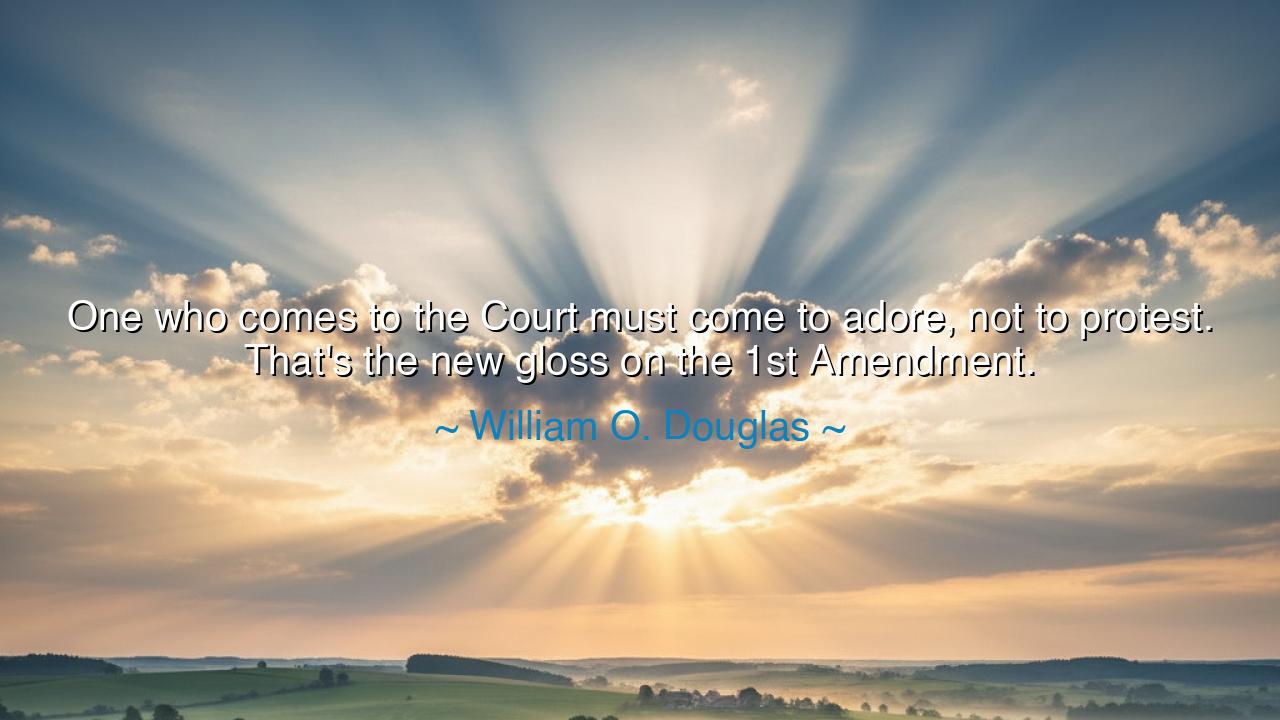
One who comes to the Court must come to adore, not to protest.
One who comes to the Court must come to adore, not to protest. That's the new gloss on the 1st Amendment.






“One who comes to the Court must come to adore, not to protest. That’s the new gloss on the First Amendment.” So declared Justice William O. Douglas, one of the fiercest defenders of liberty ever to sit upon the Supreme Court of the United States. His words were not spoken in praise, but in warning — a lament cloaked in irony. For in that single sentence, Douglas captured the slow and perilous transformation of freedom from a living flame into a gilded idol: revered, but no longer alive. He spoke of a time when dissent, once the heartbeat of democracy, was being smothered beneath the robes of authority — when the right to protest, sacred under the First Amendment, was being twisted into submission.
Douglas uttered these words in 1969, dissenting from the Court’s ruling in Adderley v. Florida and later echoing the sentiment in other cases where public protest collided with public power. The case concerned students who had peacefully gathered to object to racial injustice. Yet the Court upheld their arrest, claiming they had trespassed upon state property. Douglas saw in this not law, but fear disguised as order. His warning was sharp and clear: when power demands reverence rather than accountability, when the people may only “adore” and not question, then liberty is already in peril.
To the ancients, such a moment would have been recognized as the turning of the wheel — the passage from republic to empire, from citizens to subjects. For all tyrannies begin not with chains, but with silence. When the people are told where they may stand, how they may speak, and to whom they must bow, the spirit of freedom begins to die long before its body falls. Douglas, like a prophet among judges, cried out against that slow death. His was not the voice of rebellion but of remembrance — a call to return to the first principles that gave the nation birth.
Consider the example of Socrates, who in ancient Athens stood before his own court not to adore, but to question. He challenged the comfort of the powerful and paid with his life, drinking the hemlock with calm defiance. Yet in that act, his dissent became immortal. Athens killed his body, but not his voice; and through his protest, generations learned that truth is the child of questioning, not of obedience. So too did Douglas understand that without protest, democracy becomes a hollow ritual — a nation kneeling before its own institutions rather than standing within them.
His warning also speaks beyond courts and constitutions. It speaks to the eternal struggle within every society — between the love of order and the need for truth. Adoration, when misdirected, is a velvet chain. It soothes the conscience while binding the soul. To question is painful, but to cease questioning is to fall asleep. The true patriot is not the one who worships the state, but the one who holds it to its own promises. In Douglas’s eyes, the First Amendment was not a ceremonial shield but a living sword — meant to cut through the false pieties of power and keep the people awake.
In our own time, this lesson resounds with new urgency. There are always those who will tell you to be quiet, to trust the system, to let the “experts” and the “authorities” decide what truth may be spoken. They will wrap censorship in the language of safety, and call silence peace. But beware: when protest becomes a crime and conformity a virtue, freedom becomes a memory. The same spirit that once stood in the streets of Selma, in the squares of Athens, and before the steps of the Court must not fade. The duty of a free people is not only to obey the law but to question it — not only to enjoy liberty but to defend it.
So, my children, take this teaching to heart. Do not come to the Court to adore; come to remind it of its own covenant. Do not come to power with reverence, but with responsibility. Speak when silence is demanded of you, and stand when kneeling is easier. For freedom is not preserved by comfort but by courage — not by those who praise the throne, but by those who dare to question the king. The First Amendment, born from rebellion, was written for rebels of conscience. Let it not become a relic of obedience.
And thus remember the wisdom of Douglas: the right to protest is the lifeblood of a republic. Without it, democracy becomes a cathedral of silence — beautiful, but dead. Therefore, guard your voice as sacred, your dissent as holy, and your courage as the true offering of a free soul. For history does not remember the ones who adored; it remembers the ones who spoke.






AAdministratorAdministrator
Welcome, honored guests. Please leave a comment, we will respond soon